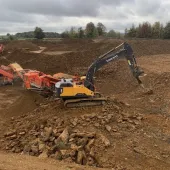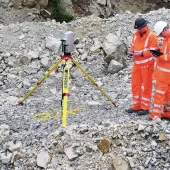Linking minerals to economic growth

The 2017 joint MPA/RTPI mineral planning conference considers the future challenges and opportunities
MORE than 220 attendees from over 110 different organizations, including the minerals industry, national agencies, local government, NGOs and specialist consultancies from as far afield as Cornwall, Northumberland and Ayrshire, attended the annual joint Mineral Products Association (MPA)/Royal Town Planning Institute (RTPI) mineral planning conference at the Birmingham NEC on 24 May.
Following recent government infrastructure and regional growth announcements, the conference considered how the minerals industry and stakeholders are responding to the growth agenda, and the challenges and opportunities arising from the need to maintain a steady and adequate supply of minerals to support future construction needs.
Using the conference to launch the MPA’s latest study on long-term aggregate demand and supply, which suggests the potential cumulative demand for construction aggregates until 2030 could be between 3.2 and 3.8 billion tonnes, MPA chief executive Nigel Jackson emphasized that as central government withdraws from providing evidence to support the delivery of the mineral planning system, others will need to fill the gap.
He also reiterated how important is for the Government’s developing industrial strategy to consider mineral supply as a key enabler for the delivery of wider growth priorities.
Other speakers at the conference included Gordon McCreath, a partner with Pinsent Masons, Adrian Cooper, planning policy and strategy manager at Shropshire Council, and Craig Jordan, head of economic growth at Litchfield District Council, who provided interesting perspectives on infrastructure, housing and regional growth, and the role mineral planning should play to enable successful delivery.
Harvey Bradshaw, executive director of environment and business at the Environment Agency, outlined how the Agency is helping to deliver sustainable growth, and how all parties should explore opportunities to deliver win-win outcomes against the growing pressure on central government resources.
Barristers Richard Kimblin QC and Jack Smyth from No5 Chambers provided a legal update, addressing recent developments around the consideration of what constitutes a valued landscape, the openness of the Green Belt, and air quality.
Russell Gadbury, marine planning manager with the Marine Management Organisation, spoke about marine planning, its relevance to maintaining the marine contribution to supply through the adoption of marine mineral safeguarding policies, and the policies to project essential wharf infrastructure.
Using MPA members’ sites as examples, David Payne, senior planning advisor at the MPA, explored the importance of mineral supply to development and growth, and the need for the mineral infrastructure safeguarding policies to protect wharf and rail facilities to be applied effectively.
Finally, John Mills, planning advisor with the RSPB, highlighted achievements made by the Nature After Minerals (NAM) initiative, which promotes landscape and biodiversity at restored mineral sites.
Commenting on the event, Mark Russell (pictured), executive director of planning at the MPA said: ‘This year’s conference provided an excellent opportunity to discuss and explore some of the practical challenges facing everyone involved in mineral planning, including constraints in skills, capacity and funding.
‘But it also provided a platform to consider ways in which industry, mineral planners and other interested parties can improve delivery by working more closely with one another.
‘Housing and infrastructure have been clearly identified as key drivers for the Government’s growth agenda, with £500 billion of investment anticipated in infrastructure alone.
‘Minerals and mineral planning will play a crucial role in enabling these policy aspirations to be delivered in the most sustainable and cost-effective way, with more than 3 billion tonnes of construction aggregates likely to be needed by 2030.
‘However, a longer-term view around how we meet future demands is essential if we are to maintain steady and adequate supply of construction aggregates,’ said Mr Russell.









